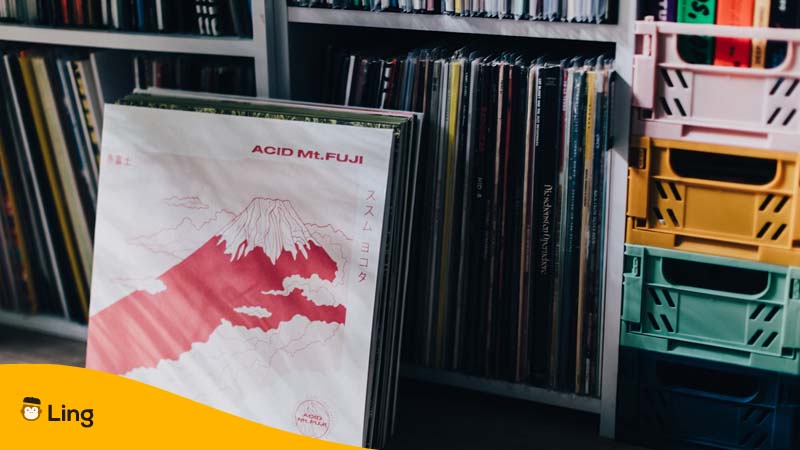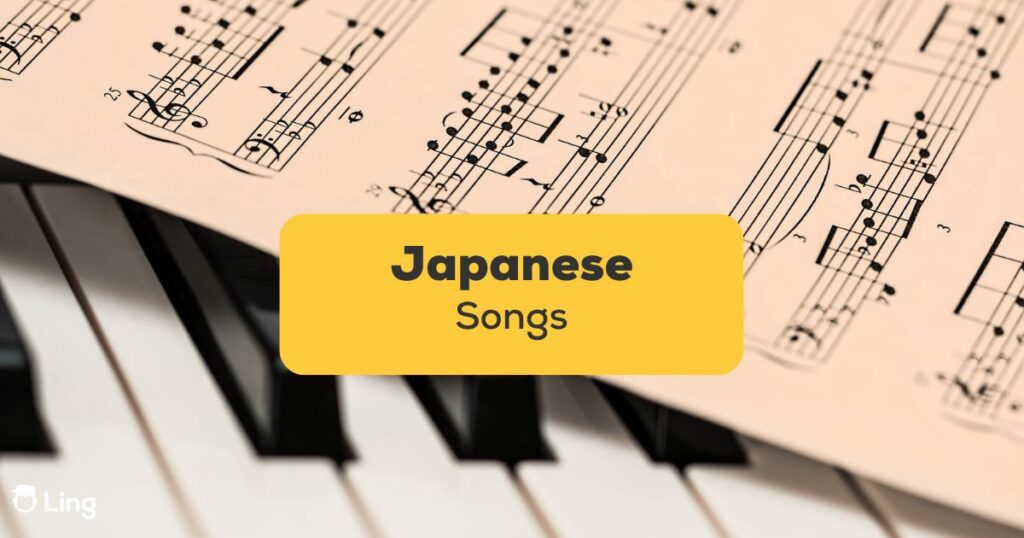Listen up, music lovers, because the world of Japanese songs is a treat for the ears! You can find the influences of gritty rap, guitar-heavy country, mainstream bubblegum pop, and lost love ballads woven into songs created by Japanese artists. There’s something for everyone!
From famous Japanese hits to the underground word-of-mouth songs you can find in a random YouTube playlist, Japanese culture is greatly reflected by the wonderful art this country produces. Japanese music makes up a huge part of the vibe that makes Japan… Japan! Stay tuned if you want to dive into the world of Japanese music.
Table Of Contents

Japanese Songs: Popular And Hidden Gems
If you ask a Japanese local to name some of their all-time favorite Japanese songs, they might name the ones on this list! Many of them span sub-genres like ska, hip-hop, folk, and city pop—the latter being my favorite, best known for its breezy and funky production notes. Listen to these popular songs and try to resist putting them on replay.
Popular Songs
1. Miki Matsubara’s ‘Stay With Me’ is a bonafide city pop classic. It was the musician’s debut single, and it quickly became her first hit song, peaking at #28 on the Oricon Charts (the Japanese singles popularity chart) and has since inspired countless covers.
2. Tomoko Aran’s ‘Midnight Pretenders’ made a huge splash when it burst onto the music scene. With funky instrumentals that lull the song into a jazzy piano outro, this song is considered one of the best from the musician’s critically acclaimed 1983 Fuyukukan album.
3. ‘Sweet Love’ is a soulful song by Junko Ohashi that showcases the artist’s powerful vocals against a powerful saxophone. It is an incredible way to open the 1995 album For Tomorrow, which contains wonderful hits like this one!
4. ‘4:00 A.M.’ is a song off Taeko Onuki’s album Mignonne, which, translated from French, means “cute.” This song has only recently seen success, with a huge internet following. Sugoi!
Hidden Gems And My Own Recommendations
5. ‘Pray’ (プレイ) by Tommy heavenly6. It is a fun and peppy song that embraces the caring and loving nature of a relationship through a rocking electric guitar and hard-hitting drums. This song was featured as the first Gintama anime opening!
6. ‘Dawn in the Adan’ by Ichiko Aoba is an ethereal and dreamy folk tune deeply inspired by the artist’s own dreams!
Nujabes was a master at creating beats that featured a ton of diverse elements in the late artist’s discography. He is even credited with sparking the creation of the lo-fi genre. ‘Feather’ is just one example of an innovative explosion that creatively combines gentle piano with rap verses in collaboration with Cise Starr and Akin from CYNE.
Fun fact: Nujabes was the brain behind the hip-hop-ified soundtrack to the 2004 anime Samurai Champloo!
7. ‘Remember Sunny Days’ by Anri is the perfect song to get you through a long summer road trip while coasting down a highway for miles. The sweet vocal harmonies and instrumentals definitely feel like a welcome breeze in your hair while the sun beats down on you.
Want to check out even more Japanese songs? Check out this playlist that features a bunch of the most popular Japanese songs of all time that you will definitely have on loop!
Anime Songs
If you’re an anime lover, chances are you’ve heard some of the most iconic songs to jump out of the Japanese music sphere.
8. One Piece’s famous ‘We Are!’ (ウィーアー!) by Hiroshi Kitadani has been a mainstay in the anime opening song history since the anime first burst onto the scene back in 1999. Its famous chorus that emphasizes a collective spirit strikes a chord for those ready to set sail for adventure!
9. Naruto’s nostalgic ‘Far Away’ (遥か彼方, Haruka Kanata) by ASIAN KUNG-FU GENERATION is an energetic jolt that is the perfect hype song if your match is up next in the Chūnin exams! My personal favorite, though? The undeniable pop gem Blue Bird (ブルーバード, Burū Bādo) from Naruto Shippuden performed by the Japanese band Ikimonogakari.
10. Neon Genesis Evangelion was received by the general public to critical acclaim with its themes of freedom, consciousness, spirituality, and individualism set against an alternate version of Tokyo that is under attack by intriguing creatures from space. Ironically, its J-pop theme song, ‘A Cruel Angel’s Thesis’ (残酷な天使のテーゼ, Zankoku na Tenshi no These), performed by Yoko Takahashi, became a super hit with fans of the anime and casual listeners alike!
Those were just a few of my favorites from the anime side of things, but definitely not all of them! Others include Haikyuu’s ‘FLY HIGH!!’ by Burnout Syndromes, ‘Unravel’ by TK from Tokyo Ghoul, Fullmetal Alchemist Brotherhood’s ‘Again’ by YUI, and Gintama’s ‘Shuura’ (修羅) by Does.

Japanese Songs… From A Fake Band?
What if I told you Japanese music is so cool that even songs from a fictional band break the mold and become popular? It’s true!
The soundtrack to the cult classic movie All About Lily Chou-Chou (2001) features music from “Lily Chou-Chou,” which is—you guessed it—a fake band! It was created just for the movie, which is the actual brainchild of Japanese director Shunji Iwai, Japanese producer Takeshi Kobayashi, and vocalist Salyu.
This Japanese indie album, Kokyuu (Breathing in English), provided the soundtrack to the movie and features melodramatic hits like ‘Glide’ (グライド, Guraido) and ‘Arabesque’ (アラベスク, Arabesuki) as well as the enigmatically jumpy ‘Airship’ (飛行船, Hikousen). My personal favorite? The darkly swaying beat of ‘Erotic’ (エロティック, Erotikku).
How To Say Song In Japanese?
There are two ways to say “song” in Japanese: Uta (歌) and Kyoku(曲).
Vocabulary Related To Music In Japanese
Let’s take a look at some music-related vocabulary in Japanese.
| English | Japanese | Romanization |
|---|---|---|
| Sound | 音 | Oto |
| Music | 音楽 | Ongaku |
| What song is that? | それは何の曲ですか? | Sore wa nan no kyoku desu ka? |
| I like that song. | 私はその歌が好き。 | Watashi wa sono uta ga suki. |
| Turn the volume up/down. | 音量を上げてください。/ 音量を下げてください。 | Onryō wo agete kudasai. / Onryō wo sagete kudasai. |
| Pop | ポップ | Poppu |
| Country | カントリ | Kantorī |
| Punk rock | パンクロック | Pankurokku |
| Rap | ラップ | Rappu |
| Alternative | オルタナティブ | Orutanatibu |
Frequently Asked Questions About Music In Japanese
1. What Is The Popular Genre Of Music In Japan?
While Japanese artists explore a range of genres (and Japanese citizens enjoy literally everything!), Japanese popular music (or J-pop) is called ryūkōka—which breaks down into sub-genres of enka (sad and sentimental ballads) and poppusu (lively and energetic beats that make up a lot of Japanese hits.)
2. What Is The Most Listened To Song In Japan?
The answer to this changes all the time! Japan is super diverse in its music listening habits, probably because they produce so many hit songs that the masses enjoy regardless of genre. In 2023, the most popular song on streaming platforms was the opening song “Idol” for the hit anime series Oshi no Ko, created by the Japanese musician Yoasobi with more than 527 million streams from November 2022 to November 2023!
3. What Is The Only Japanese Song To Top The Billboard 100?
The Billboard charts in the US update constantly to keep up with the most catchy, innovative, and lyrically punchy songs out there. In other words… the hits! For an English-speaking market, a Japanese song gracing the Billboard 100 is a big deal. One of the few songs to ever do that was Sukiyaki back in 1963 by artist Kyu Sakamoto.
Closing Words
You can take an entire trip around the world just by listening to Japanese music. With tons of genres that bounce all over the place, it’s no wonder that Japanese music is popular all over the world and with non-native Japanese speakers too! You can find great songs in anime and movies, sitting at the top of the music charts, or even hiding around the corner and getting played by a local band.
As a Japanese music lover myself, I appreciate the rhythm, but it would be awesome to understand the lyrics as well! Here’s a tip: keep listening to Japanese music if you’re serious about learning Japanese. It’s proven that music can help your brain grasp the language as you take in word pronunciation in conjunction with easy-to-remember beats.
If you want to learn to sing along with your favorite Japanese songs, you should consider trying to learn Japanese! With enough effort and dedication, you’ll be singing along in no time!



































































